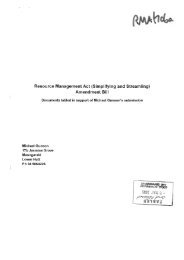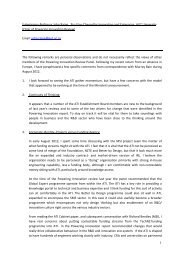Parliamentary Debates (Hansard) - New Zealand Parliament
Parliamentary Debates (Hansard) - New Zealand Parliament
Parliamentary Debates (Hansard) - New Zealand Parliament
You also want an ePaper? Increase the reach of your titles
YUMPU automatically turns print PDFs into web optimized ePapers that Google loves.
3734 Local Government (Auckland Council) Bill 16 May 2009<br />
time while the House is sitting, except during oral questions, during any evening on a<br />
day on which there has been a sitting of the House, or on a Friday in a week in which<br />
there has been a sitting of the House, and to meet outside the Wellington region during<br />
the sitting of the House, despite Standing Orders 187, 189, and 190(1)(b) and (c).<br />
Auckland is <strong>New</strong> <strong>Zealand</strong>’s only city of scale, and it is the country’s main gateway<br />
to the world. Because of Auckland’s scale, Auckland’s and <strong>New</strong> <strong>Zealand</strong>’s success go<br />
hand in hand. As a large and outward-looking city, Auckland can, and should,<br />
contribute more to national prosperity and productivity than it does now.<br />
Governance arrangements for the Auckland region have been a cause of concern for<br />
at least the last 50 years. There have been some efforts by successive Governments to<br />
address the problems, but those efforts have clearly been insufficient. How local<br />
government is structured is important in determining what gets done, and, indeed, what<br />
does not get done in Auckland. Governance arrangements affect the capacity to plan on<br />
an integrated, region-wide basis, and the ability to solve large and longer-term<br />
challenges effectively. Governance arrangements affect citizens’ ability to have a say<br />
about what services and initiatives they value.<br />
The previous Government commissioned the Royal Commission on Auckland<br />
Governance to inquire into, investigate, and report on the local government<br />
arrangements that are required in the Auckland region over the foreseeable future. After<br />
wide consultation with Aucklanders, and consideration of over 3,500 submissions, the<br />
royal commission reported to the Government on 25 March 2009. The royal<br />
commission has done an admirable job of consulting with Aucklanders and formulating<br />
their recommendations. I take this opportunity to thank the commissioners for their<br />
work.<br />
The royal commission’s report identified two broad, systemic problems evident in<br />
current Auckland local government arrangements. Regional governance is weak and<br />
fragmented, and community engagement is poor. The commission’s report addressed<br />
the issues and identified solutions. In particular, it exhaustively described the range of<br />
opinions in Auckland’s many communities. We accepted the key points of the<br />
recommendations: one council for Auckland, one mayor with governance powers, one<br />
long-term plan, and one rates bill.<br />
We did not agree with the recommendations about Māori representation. That will<br />
not come as a surprise. If the people of Auckland or the council want specific Māori<br />
seats on the council, they already have the ability to enable that. The Government will<br />
not impose the seats. We did not agree with the proposal to have six sub-councils. We<br />
want more local representation, not less. We want communities to know they have their<br />
own local representatives, so we have opted to have 20 to 30 local boards. I am proud<br />
that places like Waiheke, which Nikki Kaye represents so well, for the first time will<br />
have their proper local representation recognised in statute.<br />
This Government has resolved to act. The Government aims to put the new structures<br />
in place in time for the October 2010 local government elections. This short transition<br />
period will minimise uncertainty and disruption for council staff and the public.<br />
Legislation required to give effect to these decisions has been introduced as three<br />
separate bills. We have tried to balance the need for action with the need for continued<br />
democratic input. That is why we have split the legislation to effect reform into three<br />
bills, of which this bill is the second.<br />
The first urgent bill—the Local Government (Tamaki Makaurau Reorganisation)<br />
Bill—provides the necessary legislative mechanisms for transition to the new Auckland<br />
governance arrangements, which needs to occur as soon as possible in order to establish<br />
the Auckland Council by 2010. That bill has proceeded through all stages under<br />
urgency and without select committee consideration.






![Full evidence text [PDF 8908k] - New Zealand Parliament](https://img.yumpu.com/14025494/1/184x260/full-evidence-text-pdf-8908k-new-zealand-parliament.jpg?quality=85)
![−3 JUN 2009 IRELEASED] - New Zealand Parliament](https://img.yumpu.com/12829724/1/185x260/3-jun-2009-ireleased-new-zealand-parliament.jpg?quality=85)
![Full paper text [PDF 3515k] - New Zealand Parliament](https://img.yumpu.com/11267192/1/184x260/full-paper-text-pdf-3515k-new-zealand-parliament.jpg?quality=85)


![Full evidence text [PDF 9k] - Parliament](https://img.yumpu.com/7938085/1/184x260/full-evidence-text-pdf-9k-parliament.jpg?quality=85)





